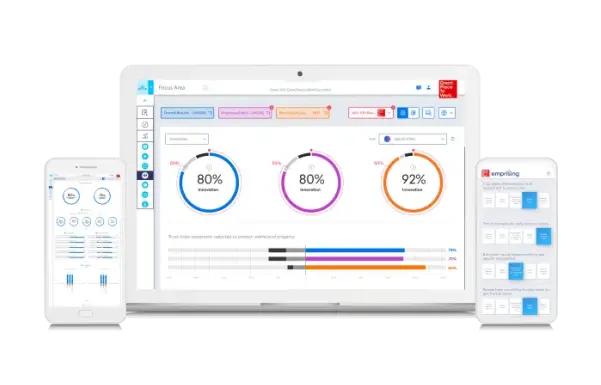
Employee recognition has long been a cornerstone of effective management. But today, as the competition for talent escalates, how organizations value their employees has become more important than ever.
Creating a recognition program is a start — so if you don’t have one, that’s a good first step! — but it’s not something smart organizations do one time and accept as perfect. Great organizations constantly reevaluate the ways they reward employees. This ensures they meet the needs of both their people and the market.
As companies grow, this becomes even more of a challenge, and leaders must rethink the way they add value to the employee recognition experience.Before we jump ahead, let’s look at what employee recognition means.
What is employee recognition?
Employee recognition is a method of support that helps employees know their contributions are recognized and appreciated. Employees want to know how they are doing, and recognizing employees demonstrates what success looks like. Companies recognize employees for going above and beyond, for their achievements, tenure or service, or desired behaviors.
Why employee recognition matters
From a very early age, we crave recognition from parents, teachers, and friends. So strong is our desire for positive affirmation, particularly during developmental periods, that we can even perceive a neutral reaction as a negative one.
This continues to hold true as we move into the workplace. Employee recognition helps to:
- Retain top talent
- Increase employee engagement
- Encourage high performance
How to create a meaningful employee recognition culture
Many Great Place to Work® clients, even those with strong company cultures, face challenges when it comes to team and individual employee recognition.
While there is no universal program for every organization, there are five key elements of meaningful employee recognition that all managers can use.
1. Be specific, be relevant
Recognition is more meaningful when it is tied to a specific accomplishment or business objective.
When recognizing employees, explaining what the recognition is for helps employees relate the recognition to their behavior. This encourages continued strong performance.
2. Be timely
Recognition that arrives months after the fact isn’t nearly as meaningful as recognition received promptly.
The longer it takes for managers to recognize employees, the less likely employees will see the affirmations as authentic. Make employee recognition a priority and have formal systems in place so you can strike while the iron is hot.
3. Recognition comes in many shapes and sizes
There is a great deal of research that indicates people are motivated by more than just cold hard cash. It is also important to note that everyone has their own preference or style when it comes to giving and receiving appreciation.
Get a clearer picture of the primary language of appreciation (in a work setting) of every individual. Then, recognize them accordingly.
Beyond a bonus or a raise, consider customized gifts, taking them out for dinner, or other acts that show employees their reward is personalized to them.
4. Little things go a long way
While it's crucial to recognize major accomplishments, every day thank-yous can motivate employees just as much (and sometimes even more).
Writing handwritten notes, or using the intranet to promote the good behaviors of individuals, can help instill a regular culture of employee recognition. These thank-yous and shout-outs do not have to come from managers alone; some employees may find recognition from peers even more motivating.
5. Connect to the bigger picture
Recognition helps employees see that their company values them and their contributions to the success of their team and the company overall.
This is particularly key when organizations grow or change. It helps employees build a sense of security in their value to the company, motivating them to continue great work.
Regularly share news about how the company is striving to reach the mission, and explain how individual employee goals relate to that vision.
Do you know if your employees feel appreciated?
We designed an employee survey – based on 30+ years of studying employee experience – to measure and track levels of employee recognition, trust, innovation, and more.
Contact us about it today.
mployee recognition has long been a cornerstone of effective management. But today, as the competition for talent escalates, how organizations value their employees has become more important than ever.
Creating a recognition program is a start — so if you don’t have one, that’s a good first step! — but it’s not something smart organizations do one time and accept as perfect. Great organizations constantly reevaluate the ways they reward employees. This ensures they meet the needs of both their people and the market.
As companies grow, this becomes even more of a challenge, and leaders must rethink the way they add value to the employee recognition experience.
Before we jump ahead, let’s look at what employee recognition means.
What is employee recognition?
Employee recognition is a method of support that helps employees know their contributions are recognized and appreciated. Employees want to know how they are doing, and recognizing employees demonstrates what success looks like. Companies recognize employees for going above and beyond, for their achievements, tenure or service, or desired behaviors.
Why employee recognition matters
From a very early age, we crave recognition from parents, teachers, and friends. So strong is our desire for positive affirmation, particularly during developmental periods, that we can even perceive a neutral reaction as a negative one.
This continues to hold true as we move into the workplace. Employee recognition helps to:
- Retain top talent
- Increase employee engagement
- Encourage high performance






















